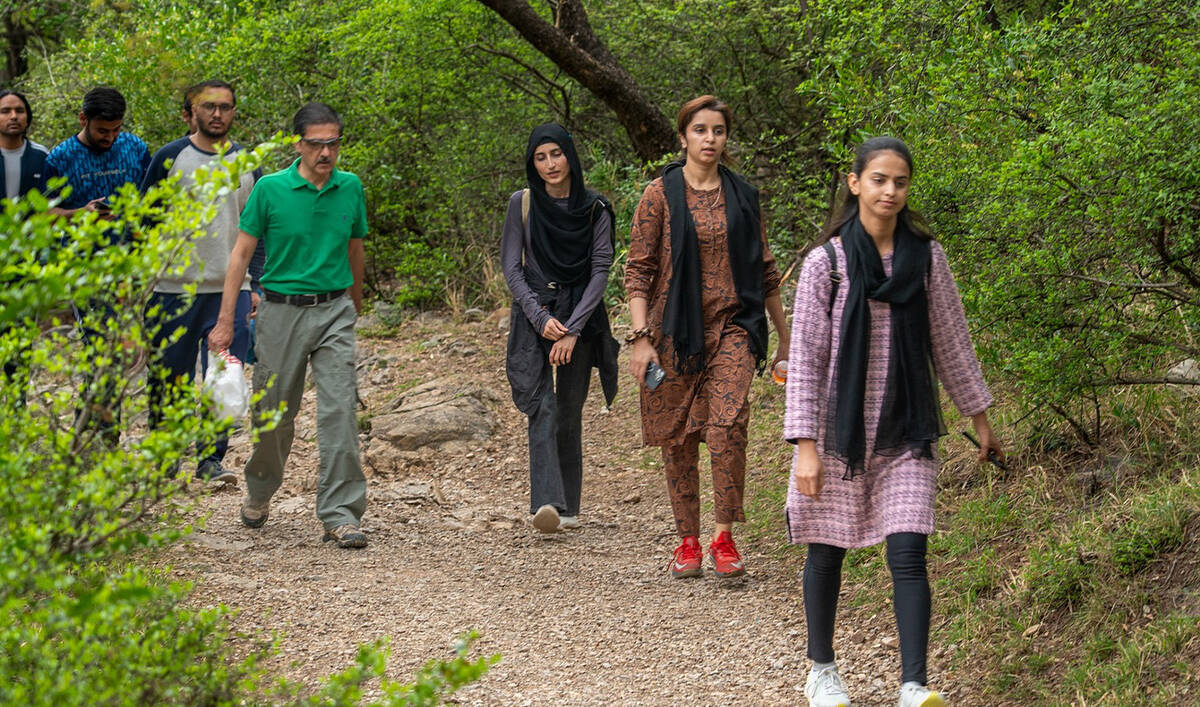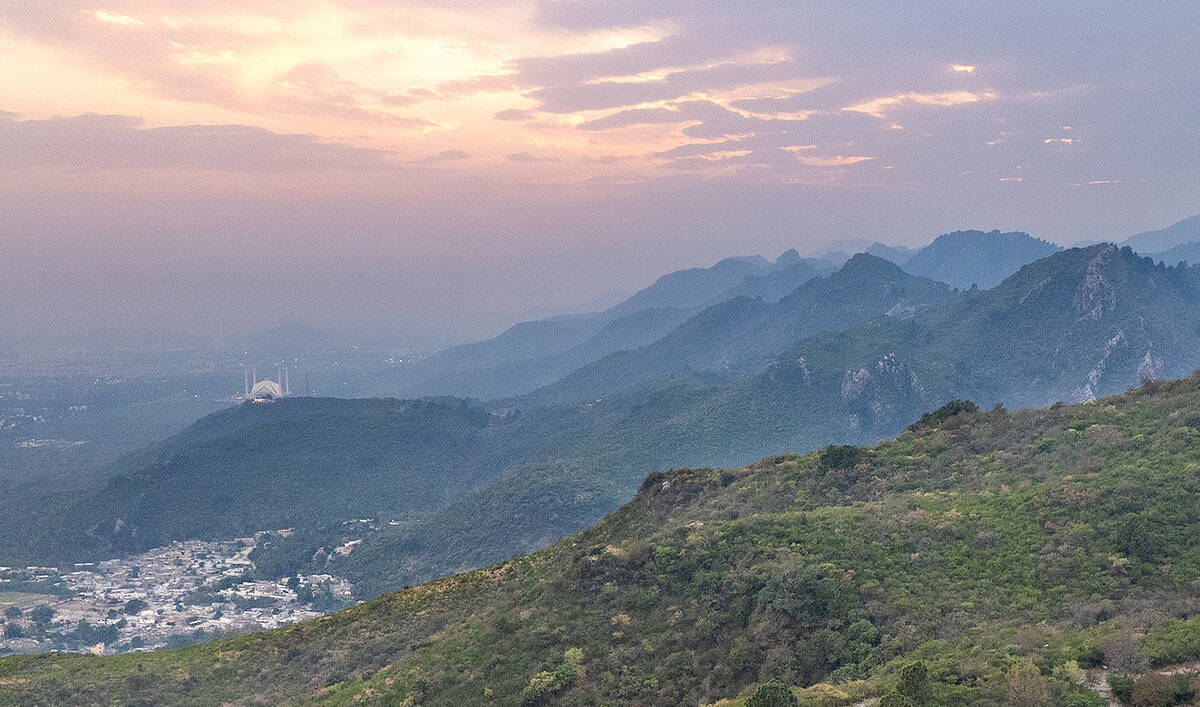PESHAWAR: Sher Zamin Khan, a 74-year-old from Peshawar, lives 17 kilometers away but has faithfully attended Friday prayers at the historic Mahabat Khan Mosque since 1989.
Khan’s dedication reflects the mosque’s allure, not just as a place of worship but as a beacon of historical and cultural significance, attracting visitors from near and far, including those from other countries, to experience its ancient legacy and communal spirit.
Located in Peshawar’s ancient walled city, the Mahabat Khan Mosque, an architectural gem from the 17th century Mughal era built under the reign of Emperor Shah Jahan, becomes a bustling hub of spirituality, especially during Ramadan, drawing worshippers in large numbers.
Named after the Mughal governor of the city at the time, the mosque has faced the ravages of time, including looting and damage during the Sikh invasion and the notorious governance of Ranjit Singh’s chosen General Paolo Avitabile, who is said to have used its minaret for executions.
“I have been coming to this mosque since 1989,” Khan said while speaking to Arab News. “I used to come [here] only for the Friday prayer [back then]. At that time, the mosque wasn’t like this. The outside floor wasn’t paved and had a small pond which contained fish.”
He agreed that there was always a bigger influx of worshippers during the Muslim fasting month of Ramadan when people offer the special Tarawih night prayer in which the Holy Qur’an is recited in full over a span of nearly four weeks.
“During Ramadan, when I come to the mosque, I don’t get a space even [in the] outside [lawn],” he continued.
The Mahabat Khan Mosque stands out for its Mughal architectural style, featuring a spacious courtyard, a blue-tiled ablution pool and elaborate decorations with floral designs and Arabic calligraphy.
It has undergone significant restoration efforts to preserve its historical essence. Today, it remains a vibrant place of worship and a heritage site, drawing visitors to its stunning architectural details and serving as a testament to Peshawar’s rich culture.
68-year-old Zahir Khan, who is a member of the mosque managing committee, said he learned how to read the Qur’an as a child under the same roof and witnessed how its ancient domes and arches drew people from far off places.
“Masjid Mahabat Khan is 400 to 450 years old, and a lot of people from foreign countries, including the Arab and other states, visit this place,” he said.
“People coming from others countries [to Peshawar] want to visit this place as it is a historical mosque,” He continued. “They want to see its history that there is such a place [in the city].”
Asked about the rising numbers of worshippers in Ramadan, he said: “Praise be to God, we are Muslims. This is a historic mosque, and a lot of people worship here [in Ramadan].”
Zia Ur Rehman, a 31-year-old Peshawar resident, said people visiting the walled city always wished to offer their prayers at this mosque.
“In Ramadan, all those who come to explore the adjoining City Bazar always come to the mosque to offer their prayers.”
Peshawar’s Mahabat Khan Mosque, a Mughal gem, draws worshippers in droves during Ramadan
https://arab.news/29xs4
Peshawar’s Mahabat Khan Mosque, a Mughal gem, draws worshippers in droves during Ramadan

- Built during Shah Jahan’s reign, the 17th century mosque attracts visitors from near and far, including other countries
- The Mahabat Khan Mosque features a spacious courtyard and decorations with floral designs and Arabic calligraphy
Pakistan dismisses UN experts’ statement calling for release of Baloch activists

- UN experts raised concerns over ‘the used of excessive force’ against ‘peaceful protesters’ in Balochistan
- Pakistan calls them ‘active participants in a broader campaign of lawlessness and violence’ in response
ISLAMABAD: Pakistan’s foreign office on Wednesday dismissed a statement issued by United Nations experts demanding the release of Baloch activists arrested during a crackdown on protests in the southwestern Balochistan province, maintaining that the statement lacked “balance and proportionality.”
The arrests came days after the separatist Baloch Liberation Army (BLA) targeted a passenger train in the mountainous Bolan region on March 11, taking hundreds of hostages. The siege, which lasted for about 36 hours, ended after a military operation that killed 33 militants. The BLA attack also claimed the lives of over 30 civilians and security personnel and was one of the deadliest train assaults in the country’s history.
According to official statements, the Baloch Yakjehti Committee (BYC), which has long campaigned for the rights of the ethnic Baloch community, initiated a protest seeking the recovery of the bodies of militants who targeted the passenger train. Subsequently, the BYC announced the arrest of its top leader, Dr. Mahrang Baloch, from a sit-in in Quetta where, according to the group, she and her colleagues were protesting with the bodies of three activists killed during clashes with the police.
The UN experts described these protests as “peaceful,” raising concern over “the use of excessive force” by the state against the protesters along with their subsequent disappearance.
“We have taken note of the press release issued by certain UN experts, which appears to be based on selective and unverified media reports,” the foreign office said in its statement. “It is imperative that public statements of this nature adhere to principles of objectivity, avoid selective criticism, reflect factual accuracy, and acknowledge the full context of the situation.”
“Regrettably, these comments lack balance and proportionality, downplaying civilian casualties inflicted by terrorist attacks while disregarding the crimes committed by miscreants who deliberately disrupt public services, obstruct freedom of movement, and create an atmosphere of insecurity,” it added.
The foreign office noted any assessment of these events should recognize that “these elements are not mere protesters but active participants in a broader campaign of lawlessness and violence.”
It maintained this was evident from the storming of the District Hospital in Quetta, where protesters “forcibly seized the bodies of terrorists” killed during the train hostage rescue operation.
“International human rights law unequivocally prohibits individuals, entities, or groups from weaponizing rights to infringe upon the rights and security of others,” the statement continued. “It also firmly upholds the right of sovereign States to take lawful and necessary action to maintain public order and ensure the safety of their citizens.”
Earlier, the UN experts had said they had been monitoring with concern reports of alleged arrests and enforced disappearances of Baloch activists over the past number of months along with the violent incidents in the past few days.
“Once again we see the use of excessive force as a first response to peaceful protests,” they noted. “We understand the deeply traumatic impact of the 11 March terrorist attack, and we express our deepest sympathy to the victims of this attack, yet a response which relies on arbitrary detention, enforced disappearances, and violent crackdowns on freedom of assembly cannot alleviate that trauma.”
The foreign office said Pakistan has an open and constructive dialogue with UN Special Procedures Mandate Holders and will continue its engagement based on principles of mutual respect, objectivity, and adherence to facts.
UN experts demand Pakistan release Baloch rights activists

- Police launched pre-dawn raid on Saturday to arrest the activists who had been protesting detention of peers
- On Sunday, protesters were charged with terrorism, sedition and murder, as per police charge sheet
GENEVA: More than a dozen United Nations experts demanded Wednesday that Pakistan immediately release detained Baloch rights defenders and halt its crackdown on peaceful protests.
Among those arrested in recent days was Mahrang Baloch, one of Pakistan’s most prominent human rights advocates, who has long campaigned for the Baloch ethnic group.
She and other activists took part in a sit-in protest on Friday outside the University of Balochistan in the provincial capital of Quetta.
They demanded the release of members of their support group, whom they allege had been detained by security agencies.
“We have been monitoring with growing concern reports of alleged arrests and enforced disappearances of Baloch activists over the past number of months,” the independent experts said in a statement.
Police launched a pre-dawn raid on Saturday, arresting Baloch and other activists, during which at least three protesters died. Both sides blamed each other for the deaths.
On Sunday, Baloch and other protesters were charged with terrorism, sedition and murder, according to the police charge sheet seen by AFP.
In their statement, the experts, including the UN special rapporteurs on the situation of human rights defenders, on minority issues and on counter-terrorism and human rights, decried “the use of excessive force as a first response to peaceful protests.”
Pakistan has been battling a separatist insurgency in Balochistan for decades, where militants target state forces and foreign nationals in the mineral-rich southwestern province bordering Afghanistan and Iran.
Police actions against Baloch activists have intensified after Baloch separatists earlier this month launched a dramatic train siege that officials said ended in around 60 deaths, half of whom were separatists behind the assault.
“We understand the deeply traumatic impact of the March 11 terrorist attack, and we express our deepest sympathy to the victims,” said the experts, who are mandated by the UN Human Rights Council but who do not speak on behalf of the United Nations itself.
“Yet a response which relies on arbitrary detention, enforced disappearances, and violent crackdowns on freedom of assembly cannot alleviate that trauma.”
In addition to Mahrang Baloch’s case, the experts highlighted the arrest on Monday of another woman human rights defender, Sammi Deen Baloch, along with others in front of the Karachi Press Club as they protested against the crackdown.
“We urge the Pakistani authorities to immediately release them and to refrain from abusing counter-terrorism or public safety measures against human rights defenders,” the experts said.
Pakistan’s foreign affairs ministry said it had “taken note of the press release issued by certain UN experts, which appears to be based on selective and unverified media reports.”
“Regrettably, these comments lack balance and proportionality, downplaying civilian casualties inflicted by terrorist attacks,” the foreign ministry statement added.
Pakistan’s finance chief announces plans to float Panda bonds in Chinese market this year

- Panda bonds are issued by foreign governments through Chinese financial markets
- Pakistan aims to raise about $200 million from Chinese investors by issuing these bonds
ISLAMABAD: Federal Minister for Finance and Revenue Muhammad Aurangzeb said on Wednesday Pakistan plans to issue Panda bonds this year to leverage the Chinese capital market and strengthen its economy.
Panda bonds are issued by foreign governments, companies or institutions through China’s interbank bond market or stock exchanges, with approval from Chinese regulators. Investors typically include Chinese banks, insurance companies, asset managers and institutional investors looking for yuan-denominated, low-risk assets.
Pakistan’s plan to launch these bonds can help diversify its funding sources, reduce reliance on Western markets and boost foreign exchange reserves, especially by attracting investment from Chinese institutions.
The Pakistani finance chief, who is currently in China to attend the four-day Boao Forum for Asia Annual Conference 2025, shared the administration’s plan to issue Panda bonds in an interview with CGTN English, a local news channel.
“I have been advocating and I am very keen that Pakistan, taking advantage of the second largest and the deepest capital market in the world, that we go for an inaugural Panda bond and we issue that,” Aurangzeb said.
“Because Pakistan has done previously many issues in US dollar and the Euro but we haven’t done that in the context of the Chinese capital market,” he added. “So, we are very hopeful that during this calendar year, we will do that.”
Aurangzeb announced in January the government wanted to raise about $200 million from Chinese investors through the issuance of the Panda bonds.
The development followed an upgrade in Pakistan’s sovereign rating by three major credit agencies, with the government aiming to get into the “single-B” category to return to global bond markets to raise funds.
The developments came after the country’s macroeconomic indicators considerably improved following a prolonged economic crisis that brought Pakistan to the verge of a sovereign debt default about two years ago, building massive inflationary pressure in the economy and forcing the government to raise interest rates above 20 percent.
Fitness enthusiasts challenge themselves with pre-iftar hikes in Pakistani capital

- Hikers set out hour before sunset, break fast on trails on Margalla Hills National Park
- Participants say pre-iftar hikes help boost fat burning, maintain weight in Ramadan
ISLAMABAD: Zainab Tahir struggled to catch her breath as the steep incline of the hiking trail at Islamabad’s picturesque Margalla Hills tested her endurance. Hiking can put one through physical exertion, especially when they do it on an empty stomach.
An hour before the sun sets and the call to prayer blares out from various mosques located in Pakistan’s capital city, a group of fitness enthusiasts take to the hiking trails in Margalla Hills National Park.
Islamabad Run With Us (IRU), which describes itself as Pakistan’s “pioneering running community,” is behind the pre-iftar hiking initiative.
“When you engage in pre-iftar [physical] activities during Ramadan, it gives you extra energy, an extra boost,” Qasim Naz, who founded IRU in 2016, told Arab News on hiking trail number three.
“And when someone joins in on an activity once or twice, they figure out it’s not that hard and they can sustain it comfortably.”

Naz stresses that staying active during the holy month is essential. The IRU organizes five activities a week, which include two runs and three hikes.
“Either we can maintain our weight, or if our goal is weight loss, we can achieve it by being in a calorie deficit while eating a healthy diet and exercising,” Naz explained.
Tahir, 22, meanwhile said she was committed to reaching the top of hiking trail before sunset. This was the second time she was hiking with IRU.
She agreed with Naz that group activities are “much easier” to sustain.
“I think it is important to go at your own pace and it’s so much easier with the group,” Tahir, a content creator, told Arab News.
“If you go alone, it’s kind of more difficult and you are like really slow but if you go with the group you can maintain that pace and I think it’s much easier that way.”

Mahwish Ashraf, a journalist associated with a foreign diplomatic mission in Islamabad, shared how she struggled the first time she went on a pre-iftar hike with IRU.
“The first time I was hiking, I returned from in between, I couldn’t complete it,” she admitted. “So, this is my second time hiking with the IRU, and gladly, I’m at the main point, the meeting point.”
Eraj Khan, a commercial specialist visiting from Australia to spend Ramadan with his family, said pre-iftar hikes give one “lots of energy.”
“For fat burning, it’s a great activity,” Khan said. “Especially because the last two hours of fasting are the hardest, most people feel really hungry. But so far, I’m loving it.”
As the clock continued to tick and evening settled in, the hikers began to pick up their pace. For Tahir, reaching the top of the trail before sunset was a victory in itself.

She had pushed past exhaustion, embraced the challenge and proved to herself that she was capable of more than she thought she could achieve.
And according to her, hiking with the group made all the difference.
“The energy of the group keeps you going,” she said. “Even when you feel like stopping, you see everyone else moving forward, and you push through.”
Pakistan unveils ‘fastest’ EV charging station in Islamabad

- 120KW EV charging station can recharge electric vehicles within 30-60 minutes
- Government approved national EV policy in 2019, setting target of 30 percent EVs by 2030
ISLAMABAD: Power Minister Sardar Awais Leghari has inaugurated the country’s fastest Electric Vehicle (EV) charging station in Islamabad, the state broadcaster reported this week, as Pakistan moves to enact reforms of the energy sector designed to boost demand.
The government approved the National Electric Vehicles Policy (NEVP) in 2019, setting a target of 30 percent EVs by 2030.
“EVs are the future of Pakistan and the government is committed to promoting green energy,” Radio Pakistan quoted Leghari as saying on Tuesday as he inaugurated a 120kW EV charging station, which enables faster charging than standard residential chargers (3-7 kW), allowing EVs to recharge typically within 30-60 minutes.
Leghari also said the cost of electric charging units had been reduced from Rs71 to Rs39 [$0.14], which was expected to lower transportation expenses, positively impacting goods delivery and essential commodity prices.
Earlier this year, Pakistan announced a 45 percent reduction in power tariffs for electric vehicle charging stations. The government is also planning financing schemes for e-bikes and the conversion of two and three-wheeled petrol vehicles.
According to a report submitted to the government by power ministry adviser Ammar Habib Khan and seen by Reuters, there are currently more than 30 million two- and three-wheeled vehicles in Pakistan, which consume more than $5 billion worth of petroleum annually. The ministry plans to convert 1 million two-wheelers to electric bikes in a first phase, at an estimated net cost of 40,000 rupees per bike, according to the report, saving around $165 million in fuel import costs annually.
BYD Pakistan, a partnership between China’s BYD and Pakistani car group Mega Motors, told Reuters in September that up to 50 percent of all vehicles bought in Pakistan by 2030 will be electrified in some form in line with global targets.
In January, China’s ADM Group revealed plans to invest $250 million in setting up an electric vehicle manufacturing plant in Pakistan.














